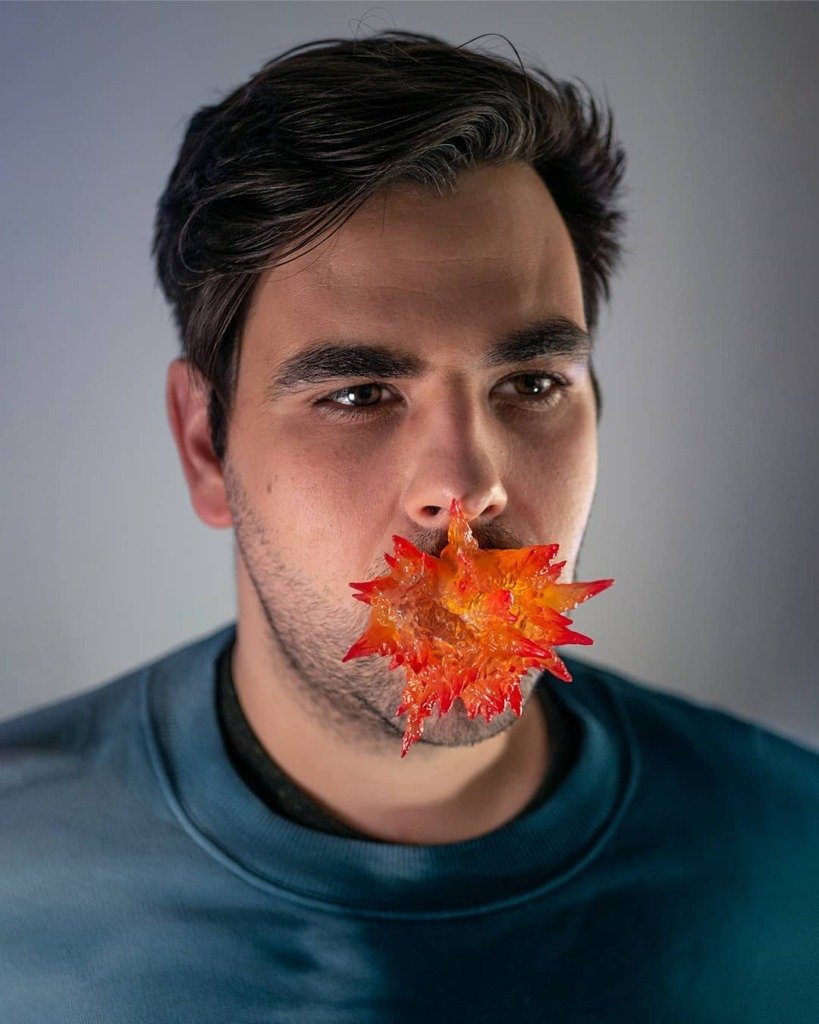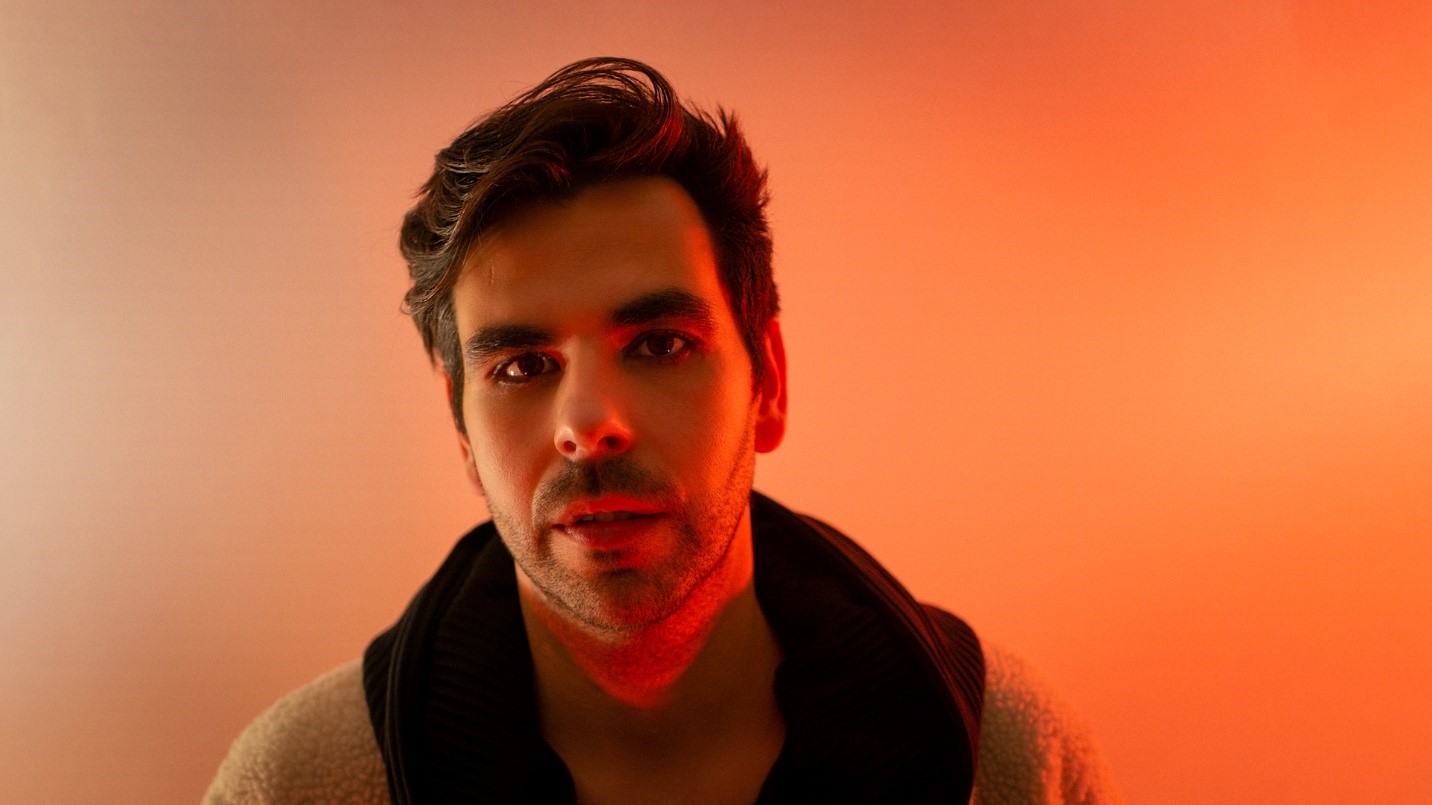London-based, of Lisbon birth Agon Branza is a celebrated queer chamber pop singer-songwriter, producer, and composer from Peckham, London. He places social justice at the center of his work, both as a lyricist and through the queer artists whose voices he amplifies as a producer. Despite being teased for listening to Björk during recess, Agon recently caught the attention of Björk’s percussionist Manu Delago, who invited him to perform with him in 2019. On stage with him were Kelly Lee Owens, Patrick Watson, Jools Holland, the BBC Orchestra, Emeli Sandé, Nitin Sawhney, Katie Melua, Guy Garvey (Elbow), Rick Astley, Cerys Matthews, Orlando Weeks, Another Sky, Eska, Ruby Turner, Alev Lenz, and Glen Scott, among others. He has worked as a producer with artists like Steinsdotter, who is currently ranked #5 on the UK Club Charts, Heren Wolf, Ana de Llor, Faultress, and Tsinder Ash, among others. Some of these artists have been played on BBC Radio 6. At Southbank’s Queen Elizabeth Hall, EartH Hackney, and Profound Sound Festival, Agon has given solo performances. He has also backed up other artists at the Royal Albert Hall, Abbey Road Studio One, the O2, the Barbican, the Roundhouse, and other locations.
Agon has already released a cycle of five piano pieces called “Inner Anthems” as part of his composing career under the name Gonçalo Abrantes. Three of Nils Frahm’s playlists for Piano Day feature his piano compositions, which have received more than 40k streams on SoundCloud. For his TV advertising efforts, he was also given a Cannes Silver Lion and a Best Soundtrack award.
His second single, “Some People,” a confessional anthem about prejudice and “otherness” that presents itself as narratively structured and harmonically rich filmic pop music, is a reflection of Agon Branza’s experience in both classical and cinematic scoring. The arrangement of the song serves as a metaphor for how society has developed over time, starting with the ancient and progressing to a contemporary, electronically layered production that is potent enough to coexist with the more traditional piano and cello sounds. Check out the song and the exclusive interview below:

1. Can you tell us a bit about where you come from and how it all got started?
AGON BRANZA: As many other kids, I was obsessed with dinosaurs and wanted to be a palaeontologist. When I was around 8 years old my parents moved right next to a music school where they enrolled me in and I eventually found music was my true passion. Since then I never wanted to do anything else (but I still know quite a lot about dinosaurs).
2. Did you have any formal training or are you self-taught?
AGON BRANZA: The school I was in had equivalence to the conservatory and I studied piano, clarinet, singing, music history, acoustics, composition and the whole 8 grades of music theory. I then did composition in college and did a BA in cinema, which made me pursue the studies of music for film, which I did an MA of in London. I am self-taught on the guitar and production. It’s funny that production is actually what takes most of my time nowadays.
3. Who were your first and strongest musical influences and why the name ‘AGON BRANZA’?
AGON BRANZA: I grew up in a house where David Bowie, Massive Attack, Björk, Peter Gabriel, Kate Bush and many others were on repeat. So I was the “weird” kid that was listening to Björk at school (and whom I still love to this day). But I have to say “Supposed Former Infatuation Junkie” by Alanis Morissette was the album that made me want to write my own music. Because of it I started listening to other confessional singer-songwriters such as Fiona Apple and Tori Amos from a very young age. There was this sort of freedom and catharsis from being able to express very personal and deep emotions through lyrics, which I always found quite therapeutical, particularly during a time when I was battling with my own identity.
It took me a long time to figure out my stage name because I wanted it to be rooted not only on my actual name (Gonçalo Abrantes) but also on the fact that most of my songs have an aspect of social commentary and discussion of sensitive themes. After I moved to London most my friends started calling me Gon. So Agon was an obvious choice, being that in the realm of literature it refers to the conflict between the main characters in a Greek play (or the characters in any literary work). Branza came from trying to find the origin of my surname, Abrantes. It seems to come from the Latin word brancĭa, which means pine needles. This combination made a lot of sense to me. In my romantic perception of things, Agon Branza means a sharp exchange of ideas.
4. What do you feel are the key elements in your music that should resonate with listeners, and how would you personally describe your sound?
AGON BRANZA: I think that for someone to enjoy my music they’d have to appreciate unpredictability, harmonic sequences outside typical pop structures and of course, a bit of drama and cinematic atmospheres. I would say my sound is what is usually called as Chamber Pop or Baroque Pop, but I have some things I want to release that definitely fall outside those boxes.

5. For most artists, originality is first preceded by a phase of learning and, often, emulating others. What was this like for you? How would you describe your own development as an artist and music maker, and the transition towards your own style, which is known as POP?
AGON BRANZA:
It’s definitely a very complex theme and my influences are very broad. While listening to alternative and mostly electronic music at home, I was studying and performing classical music in my school and then professional life. So I would say most of my musical identity comes from the mix of these things. I am now at a more matured place musically, but with my own music and previous bands, I’ve done rock, electro-rock, solo guitar singer-songwriter stuff and full-blown orchestral music. The trick to achieve the music I do now, and at the same the hardest part of it, is to try and blend all these influences into a balanced sound.
6. What’s your view on the role and function of music as political, cultural, spiritual, and/or social vehicles – and do you try and affront any of these themes in your work, or are you purely interested in music as an expression of technical artistry, personal narrative, and entertainment?
AGON BRANZA:
I think everything is political. I do consciously choose to approach these themes directly and try to create discourse, but I also think every other music or art, be it personal narrative or pure entertainment have something to say, culturally, socially, etc. – where does it come from? Who does it come from? What are their experiences? I think art in any form mirrors the society which it comes from. Therefore it’s an invaluable cultural, political and societal vehicle.
7. Do you think is it important for fans of your music to understand the real story and message driving each of your songs, or do you think everyone should be free to interpret your songs in their own personal way?
AGON BRANZA:
I do like to write things that leave space for interpretation. Growing up listening to confessional singer-songwriters, I always found it fascinating that such individual experiences could be interpreted in so many different ways. Sometimes specificities can be looked over in order to connect better with the audience. My latest single “Some People” is quite specific, but one of the most wonderful feedbacks I’ve had was from a critic saying that living in a very conservative state he could relate to the lyrics, which he thought try to bridge the gap between us all. The song explicitly talks about discrimination, but my hopes are that any person who has gone through it could identify with the lyrics. In short, I intend to write my truths in a way that they can be taken as the listener’s own.
8. Could you describe your creative processes? How do usually start, and go about shaping ideas into a completed song? Do you usually start with a tune, a beat, or a narrative in your head? And do you collaborate with others in this process?
AGON BRANZA:
I think I’m a very visual person, hence writing music for image comes so naturally to me, and that’s why I usually start with the lyrics. The text creates an image and an atmosphere I can then write music to. That is probably why my music is always described as quite cinematic.
Because the themes are usually deeply personal, I find it hard to write a song collaboratively for my own project. I think that being a producer and co-writing frequently for other artists ends up balancing this a little.
9. What has been the most difficult thing you’ve had to endure in your life or music career so far?
AGON BRANZA: When still living in Portugal I had a band called Soapbox and our future seemed very bright. We won an award for best alternative band and were picked to open for a huge band at a big festival after just a few months of existence. The band was Depeche Mode, who unfortunately had to cancel the gig – which we found out whilst driving to the festival – leaving us playing for an almost empty stadium, as almost everyone decided to get their tickets refunded. After that we started recording an album and were contacted by a big manager who wanted to work with us. The music scene in Portugal was incredibly limited and small, so this was a big thing. It was all in the works until this man completely disappeared and left us wondering what had happened. After this I was still contacted by a major label who said they loved my work but wanted me to do music that was more appealing to the masses and I turned their offer down. After all these experiences the expectations came crashing down and that is when I decided to leave the country.
10. On the contrary, what would you consider a successful, proud or significant point in your life or music career so far?
AGON BRANZA: There have been many, from performing live with Manu Delago (Björk’s percussionist) to be on stage at the Barbican with Patrick Watson – who I am a huge fan of – and the BBC Orchestra, or performing my own song backed by the London Contemporary Voices at the Southbank Centre. I am also very proud of the song I have now released, and hopeful that the most significant point in my career is yet to come.
KEEP IN TOUCH:
FACEBOOK | INSTAGRAM | TWITTER | SPOTIFY | BANDCAMP | WEBSITE | YOUTUBE

Photo credits: Luis Nogueira
